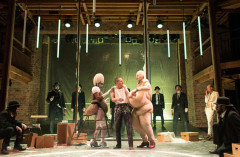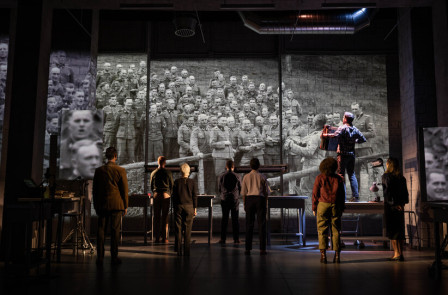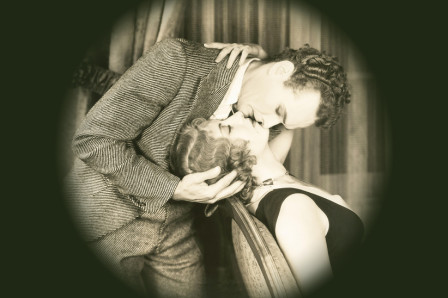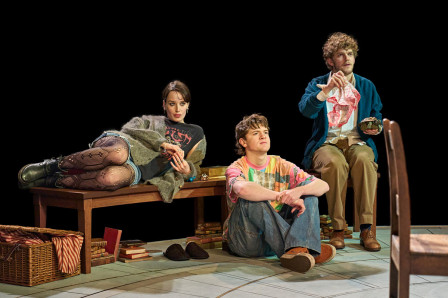Review: The RSC's DR FAUSTUS at The Barbican Theatre
 You can imagine how electrifying DR FAUSTUS must have been when it was first performed to a 16th century audience of Christians and indeed people who'd face persecution for atheism.
You can imagine how electrifying DR FAUSTUS must have been when it was first performed to a 16th century audience of Christians and indeed people who'd face persecution for atheism.
The oft imitated story concerns an academic who summons demons in a religious act of defiance and barters his soul in exchange for a life time of unlimited knowledge.
These days, when faith plays so little part in most of our lives, we can't really expect the piece to pack the same punch. Without the audience's fear of, or belief in, damnation it can be a rather dull series of tableaux as Faustus is led on a guided tour of the forbidden by the devil Mephistopheles. Directors often insert scenes of excess to titivate a modern audience and that was certainly the approach director Jamie Lloyd recently took when he staged it with Kit Harrington, from TV's Game of Thrones, stripped to his underwear, in the recent West End production.
Barely a year after this the Royal Shakespeare Company present a rather more austere interpretation at the cavernous Barbican Theatre with no celebs in their self-consciously multi-ethnic cast.
The stage is quite bare. Framed paper screens, through which the characters burst, act as a back drop with the forestage littered with modern boxes of books and documents representing Faustus's study.
Faith may not be the prevailing force but fate is because the production opens with two actors lighting matches. The one who's flame extinguishes first gets to play Faustus and the other Mephistopheles, although if you don't buy a programme you'd have no idea this is happening.
Faustus then paints a circle on the stage with some demonic insignia, sets fire to some documents and incants a spell to summon his demon guide. He's introduced to an outrageously costumed seven deadly sins and, in the creepiest section of this production, he lusts after a pubescent Helen of Troy, as expressed through interpretive dance.
As you might imagine it all ends messily for our title character.
The narrative, cut by the director, Maria Aberg, is staged with a great deal of wit and panache over an interval-less 1 hour and 45 minutes but it never solves the inherent problem with Christopher Marlow's play, namely that it's very hard to care about the humourless central character.
On the night I saw it Sandy Grierson played him as particularly intense and unrelatable to, in various shades of anger. Oliver Ryan as his demonic tormentor had a suitably devilish grin and great abs but lacked the electrifying charisma and playfulness that I believe the part requires.
Nevertheless this is a sincere interpretation by an intelligent team and well worth your attention.
Latest News

 HERE THERE ARE BLUEBERRIES at Stratford East - First look images released
5 February 2026 at 15:35
HERE THERE ARE BLUEBERRIES at Stratford East - First look images released
5 February 2026 at 15:35

 UK premiere of STAGE KISS heading to London
5 February 2026 at 15:16
UK premiere of STAGE KISS heading to London
5 February 2026 at 15:16

 Review: ARCADIA at Old Vic
5 February 2026 at 11:33
Review: ARCADIA at Old Vic
5 February 2026 at 11:33

 Alex Kingston and Richard Schiff star in Michael Frayn's COPENHAGEN
5 February 2026 at 10:45
Alex Kingston and Richard Schiff star in Michael Frayn's COPENHAGEN
5 February 2026 at 10:45
